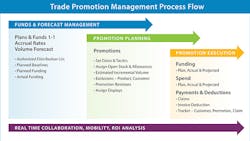Better Together: ERP and Trade Promotions Management
As consumer goods companies look to cloud ERP services to enable real-time visibility into their promotional spend, swiftly grow their business and expand to new markets, they are coming to a new conclusion: their Trade Promotion Management (TPM) systems could use significant changes, as well.
Traditionally used to support the complex relationships between suppliers and retailers, TPM systems track the promotions and discounts that drive sales in retail stores. For many enterprises, promotional spends are 20% to 30% of their overall revenue, and this makes TPM a critical system that impacts the bottom line. TPM systems have traditionally acted as niche, stand-alone services, which can make it a challenge to get to the bottom of discrepancies between orders, promotions, invoices and deductions that involve managing data across a variety of software systems. Promotions data ranges from the promotion definition, forecasting, order management, warehouse management through to shipping, invoicing and financials – all necessary to track and account for all trade spend and settlement.
Here are three main challenges that integrated TPM and ERP data can overcome:
Reduce overall discrepancies
When combined in single system, orders and invoices can be automatically related to the claims processes, which will speed the delivery of products and help to manage the reimbursement of promotion claims. This reduces the burden on retailers’ staff to track and reconcile promotional spend. It also enables consumer goods companies to provide more clarity to retailers, enhancing their understanding — and appreciation — of how the promotion supports sales.
Speed investigation of discrepancies
A combined solution reduces the time it takes to get to the bottom of queries from retailers or distributors about outstanding invoices and claims related to promotional settlement. Immediate visibility into real-time status of all orders and payments eliminates the need to query multiple systems and piece together data to identify, track and audit the activity. With answers so easily available, a consumer goods company’s sales reps can confidently resolve many issues on their own, instead of having to call into the back offices and accounting departments to manage the discrepancies.
Enable agile response to market changes
While next-gen ERP systems can now be accessed in the field using mobile devices, TPM systems are often stuck back in the data center, forcing field reps to travel back to their offices before addressing or researching claims or the status of promotions. An integrated, cloud-based solution would enable sales reps to respond to real-time changes in promotional earnings, product inventory and competitive pricing, which puts power in the hands of a field rep to adjust pricing to move more stock or counter a competitive price drop while in the field. With visibility into ERP and TPM data, consumer goods companies could collaborate more closely with retailers, using social and mobility features to plan more accurate and profitable promotions while managing smooth payout processes.
With a solution that integrates TPM and cloud ERP systems, consumer goods companies could transform the way they plan, execute, and analyze their promotional spending to optimize their ROI. With 20% to 30% of consumer goods companies’ budgets dedicated to promotions, it makes sense to monitor and manage TPM alongside every other part of the business. By adding specialized TPM functionality to their ERP system, the companies can gain comprehensive insight into business functions that include promotion planning and execution, order management, invoicing, claims settlement and accounting — insight that they never could achieve previously.
Vijay Hotanahalli is product manager at Kenandy, a leading provider of cloud ERP for mid-market and large global enterprises. He has over 15 years of progressive experience in the design and delivery of integrated CRM/ERP solutions on the Oracle and Salesforce platforms, with specialized focus on Trade Promotion Management solutions for CPG, Hi-Tech, Distribution, Health Care industries. Follow him on Twitter at @VHotanahalli.

